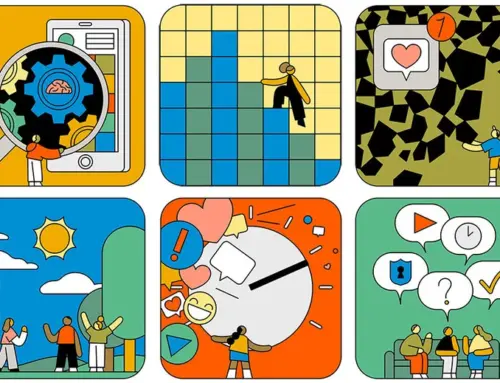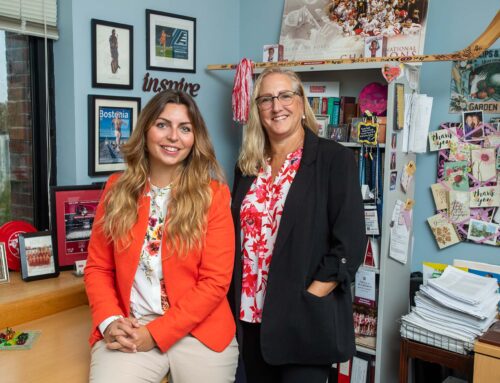For adolescents, a subtle, but powerful, shift in perspective can lead to a healthier relationship with social media and its expectations.
By Robert J. Keane and Kameron Mendes
This op-ed originally appeared in the Boston Globe Magazine. Click here to see the story.
The pursuit of happiness has been a consistent thread in the fabric of the American dream. It’s even written into our Constitution.
But take it from us, a couple of therapists: In 2022, happiness is complicated. When, in the spring of 2020, Americans hunkered down at home, working and attending school virtually if they could, many turned to social media to feel connected to others. It was understandable, of course. As the months passed, however, we noticed the toll this was taking on our adolescent patients. The reason, we found, had to do with the way the sites distorted our understanding of happiness.
We have observed this firsthand in the daily adolescent group we lead at a Massachusetts-based psychiatric hospital. Fortunately, there is a road map for relating in a healthier way to social media and expectations of happiness — and it hinges in large part on a subtle, but powerful, shift in perspective.
Running an adolescent group is something many clinicians shy away from. While there’s no question that getting adolescents to identify and, eventually, talk about how they feel is a daunting task, we have found some success by making the group highly interactive. It has also given us valuable insight on the challenges this age group faces.
Our participants speak directly to how isolated their lives had become at points during the pandemic — and how their mental health deteriorated. They recall the early days, when they were removed from school and separated from peers, and retreated to their bedrooms. Many admit to being afraid, often of things they couldn’t readily identify.
Confronted by overwhelming feelings of loneliness, many adolescents consumed large doses of social media to escape the confining walls of their bedrooms. It was not unusual for us to hear reports of double-digit hours spent daily scrolling TikTok and Instagram.
Herein lies a glaring problem: How can we expect our teens to be happy as they sit at home, while everyone they see on their social media feeds is smiling exuberantly and seemingly connected to others? These curated snippets skew our perceived ratio of boring life tasks, such as homework and chores, to fun, exciting adventures. The result is both a false sense of happiness and an inflated expectation of how happy theyshould be in their own lives.
The effect of all this adds up to a damaging message: Everyone you see and follow in this virtual world has achieved happiness and enjoys a life with an astronomically higher level of happiness than yours. The real knockout punch is the idea that if you aren’t constantly engaged in a state of blissful happiness, there must be something wrong with you. That’s powerful. And when taken to heart, depression and anxiety
soon follow.
This predicament comes amid an unprecedented rise in the mental health needs of our children. Concerned parents, worried about their child’s increasing anxiety or depression, are faced with months-long waitlists for therapists, prescribers, and other behavioral health providers. Emergency rooms across the country are struggling to manage a massive backlog of various psychiatric emergencies. Psychiatric hospitals across the Commonwealth have seen shortages of beds and challenges to recruit and retain staff members.
So how do we fix this gaping divide between the unattainable happiness of social media and reality? Though many people will point to social media as the mechanism that needs to be changed, for us the solution is not as clear-cut. We can’t close the Pandora’s box it has opened, especially as we move to an increasingly virtual world. The solution can’t simply be changes in the social platforms. It’s more complicated
than that.
A few months ago, we told our adolescent group we had developed a new theory on happiness. They were mildly curious. We launched into a preamble about how high levels of social media exposure have distorted their sense of happiness, and that the version it portrays is unattainable and unsustainable. To our amazement, they agreed.
Then we told them that we have a solution: a feeling that’s even better than happiness. And that is contentment. We define contentment as a momentary feeling of satisfaction that each of us can experience many times a day, often through very simple things. It is being aware of
something that brings us a sense of calm and well-being, and allowing ourselves to experience it. It is peaceful, not frantic.
A moment of contentment might happen when you are sitting in the sunshine and notice something beautiful in the world around you. Maybe it’s a moment of appreciation when sitting quietly on a couch with a loved one, or the feeling of having accomplished a small task. Contentment is simply feeling satisfied; not too full, not too hungry. It is the reality that life can feel normal and even dull — and being OK with that.
Through our work, most adolescents start their treatment in a fog of sickness and leave in the beginning stages of health. We believe our group helps to correct some of social media’s distortions by guiding kids to connect with each other in a real and meaningful way, not through a device with messages that are overly produced and artificial.
And we think there’s something for everyone to learn from this: Instead of searching for ways to be ever happier, take a moment to notice and appreciate the moments of contentment in your life. Connect with those around you in a genuine, authentic way. Before you know it, you may actually feel happy.
Robert J. Keane is a licensed clinical social worker, an assistant vice president at Walden Behavioral Care, and on the faculty of the Boston College School of Social Work, where he earned his doctorate. Kameron Mendes, a licensed mental health counselor, is the clinical director of the inpatient units at Walden Behavioral Care and maintains a private practice.







